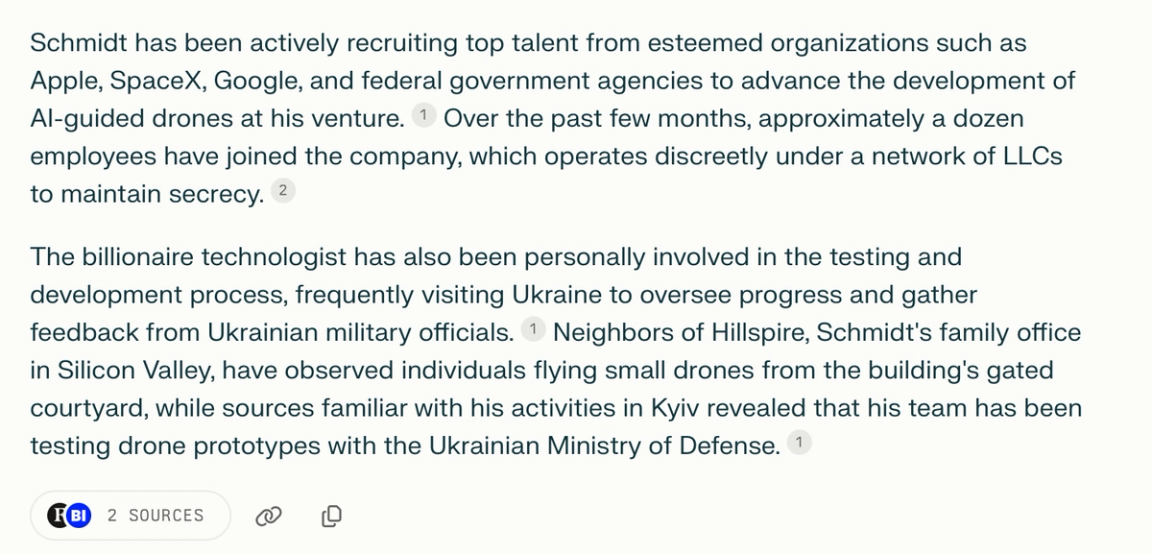 Semafor SemaforTHE SCOOP Perplexity, the AI search startup that recently came under fire from Forbes for allegedly misusing its content, was already working on revenue-sharing deals with high-quality publishers. Perplexity has not announced the details of those partnerships, but the company aims to unveil its plans soon, the company’s chief business officer, Dmitry Shevelenko, said. The deals would be a first-of-its-kind revenue stream for media companies, providing a framework to earn recurring income. In contrast, OpenAI is paying media companies upfront to use their archives for training new AI models. It’s debatable how long OpenAI and other foundation model companies will need that data, meaning the deals could be one-offs. Forbes last week accused Perplexity of plagiarizing one of its articles, an investigation into former Google CEO Eric Schmidt’s drone company. It also mentioned the reporting in one of its five-minute, AI-generated podcast episodes. Employees and executives at Forbes took to X to criticize Perplexity’s co-founder and CEO Aravind Srinivas. Among the criticisms was that Perplexity’s citations of the original Forbes article were not sufficiently prominent, which may have led some readers to infer that Perplexity authored the article. Shevelenko told Semafor that Perplexity employees worked around the clock to ship an update to the user interface that featured the citations more prominently. The update went live in about a day, according to the company.  REED’S VIEW Perplexity’s new Pages feature doesn’t replace or compete with original journalism. It competes with the news aggregation business. And humans have plagiarized so many of my articles, I’ve lost count. Sometimes the story isn’t even rewritten, it’s just posted under another byline on a new website. Rewriting content and using it to generate web traffic is part of the fabric of the internet. When I was an early employee at The Information, our scoops would get aggregated by a myriad of websites and blogs. Often, those same blogs would warn their readers that The Information had a paywall, just so readers wouldn’t waste their time clicking through. How dare anyone charge money for news? I have also lost count of the times reputable publications simply refused to credit my and others’ work. And any local news reporter can tell you what it feels like to be a victim of parachute journalism. When a national outlet swoops in, rips off your reporting and pretends to “own” the story. For decades, media outlets have tacitly gone along with this kind of “plagiarism,” mainly because, as long as the aggregated article included a link, it would send traffic back to the original publication. In fact, Perplexity’s use of the Forbes article did send some traffic back, albeit a small amount, according to Forbes Editor-In-Chief Randall Lane. Perplexity did owe a credit to Forbes high up in the article, and perhaps a better rewrite of the original text. That’s something the company fixed quickly and can refine with more time. The media business, on the other hand, isn’t so easily fixed. And as storied institutions lay off employees and face economic turmoil, there are a lot of raw nerves in our profession. Lane described Srinivas about as uncharitably as possible: “But in the hands of the likes of Srinivas — who has the reputation as being great at the PhD tech stuff and less-than-great at the basic human stuff — amorality poses existential risk.” That sentence does not match the crime. Srinivas didn’t even train the algorithms. He used them to summarize what’s out there on the internet and linked back to the original source. Yes, he could have done it better. But turning him into public enemy No. 1 of the media is not really warranted. I also wouldn’t discount the revenue-sharing idea Perplexity is planning to launch. It offers a promising alternative to a failing click-based news economy that incentivizes cheaply-made content with great headlines. But if news organizations in the AI age can earn revenue from the actual substance of articles, the incentives are much more aligned with the mission of journalism itself. And that would be progress. It would also be an ongoing revenue stream, compared to the one-off training data deals that media companies are now making with the big foundation model companies. In this particular case, I think we’ve made a mountain out of a molehill and an enemy out of a potential ally. Forbes’ editor-in-chief calls out Jeff Bezos’ investment in Perplexity. → |
| 






